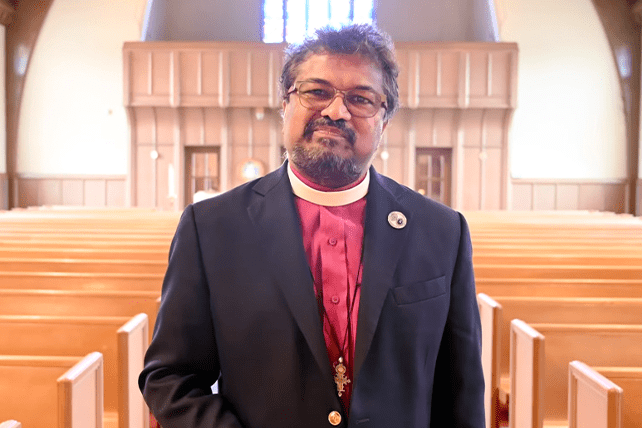(RNS) — Eighteen months since Bishop Prince Singh‘s two adult sons, Nivedhan and Eklan Singh, made allegations on social media that their father was guilty of physical abuse, alcoholism and emotional abuse, the head of the Episcopal Church has announced the misconduct complaints against Singh have been resolved.
Prince Singh, the former provisional bishop of the dioceses of Eastern and Western Michigan who resigned in September 2023, will be suspended from ministry for at least three more years, according to the terms of an accord reached between Singh and Presiding Bishop Sean Rowe.
Singh has been the subject of two clergy misconduct complaints. One involved allegations that he physically and emotionally abused his wife at the time, Roja Suganthy-Singh, and his sons; drank alcohol excessively at home; and was publicly deceitful about facts regarding his divorce with Suganthy-Singh, now his ex-wife. The second complaint, which came from members of the Episcopal Diocese of Rochester where Singh previously served, included allegations of misusing Title IV — the Episcopal Church’s process for handling clergy misconduct — and of engaging in vindictiveness and public shaming.
In an announcement released Friday (Dec. 13), Rowe said that, while Singh continues to dispute the allegations, the accord, or written resolution, resolves both complaints. The terms of the accord were approved by the Disciplinary Board for Bishops, a church court made of 10 bishops, six other clergy and six lay people.
“My goal in negotiating this accord with Bishop Singh has been to achieve Title IV’s goals by identifying paths for him to be accountable, to amend his life, and then to seek reconciliation with his family and his former diocese if and when they are willing to do so,” Rowe’s announcement, sent to denominational members via email, said. “I also expect him to repair his relationships with his colleagues in the House of Bishops.”
A media statement released Saturday morning (Dec. 14), by Singh’s church lawyer said though Singh denies the allegations, he consents to the accord’s terms and commits to completing them faithfully. “In particular, Bishop Singh deeply regrets the pain suffered by his sons and former spouse and is pledged to pursue reconciliation and healing with them,” the statement said.
However, in an email to RNS, Nivedhan Singh voiced concerns with the final accord, calling the outcome “a tragic conclusion to what has been a deeply painful and retraumatizing process.
“Despite the Episcopal Church’s well-thought-out Title IV process, this Accord highlights significant shortcomings when the Presiding Bishop exercises unilateral authority to override the findings of earlier investigative panels,” Nivedhan Singh wrote.
In July, a conference panel that oversaw informal proceedings involving Nivedhan and Eklan Singh and Suganthy-Singh’s allegations against Prince Singh emailed the involved parties the draft of a proposed order that recommended permanently removing Singh from ministry, according to a copy of the draft order obtained by RNS. The panel said it found clear and convincing evidence that Prince Singh “engaged in persistent and ongoing physical violence directed at each of his sons” and in “serious deceptive behavior in the Church for his own personal benefit,” according to the proposed order. The panel also said Prince Singh had violated church canons and continued to deny the allegations.
“The Conference Panel is now convinced, by clear and convincing evidence, that Respondent cannot be allowed to continue the exercise of ordained ministry under these circumstances and, given his unwillingness to even admit to the behavior described above, the Conference Panel finds and hereby recommends deposition from ministry to be the appropriate action for the good of the Church,” the proposed order says. However, the matter did not fully resolve at that juncture and was referred to a hearing panel.
In an email to RNS, Amanda Skofstad, public affairs officer for the denomination, emphasized that the conference panel order was a draft, and all parties must agree to a conference panel’s proposed order for it to be enforceable. “The conference panel referred the matter to a hearing panel, and no order was issued,” she wrote.

